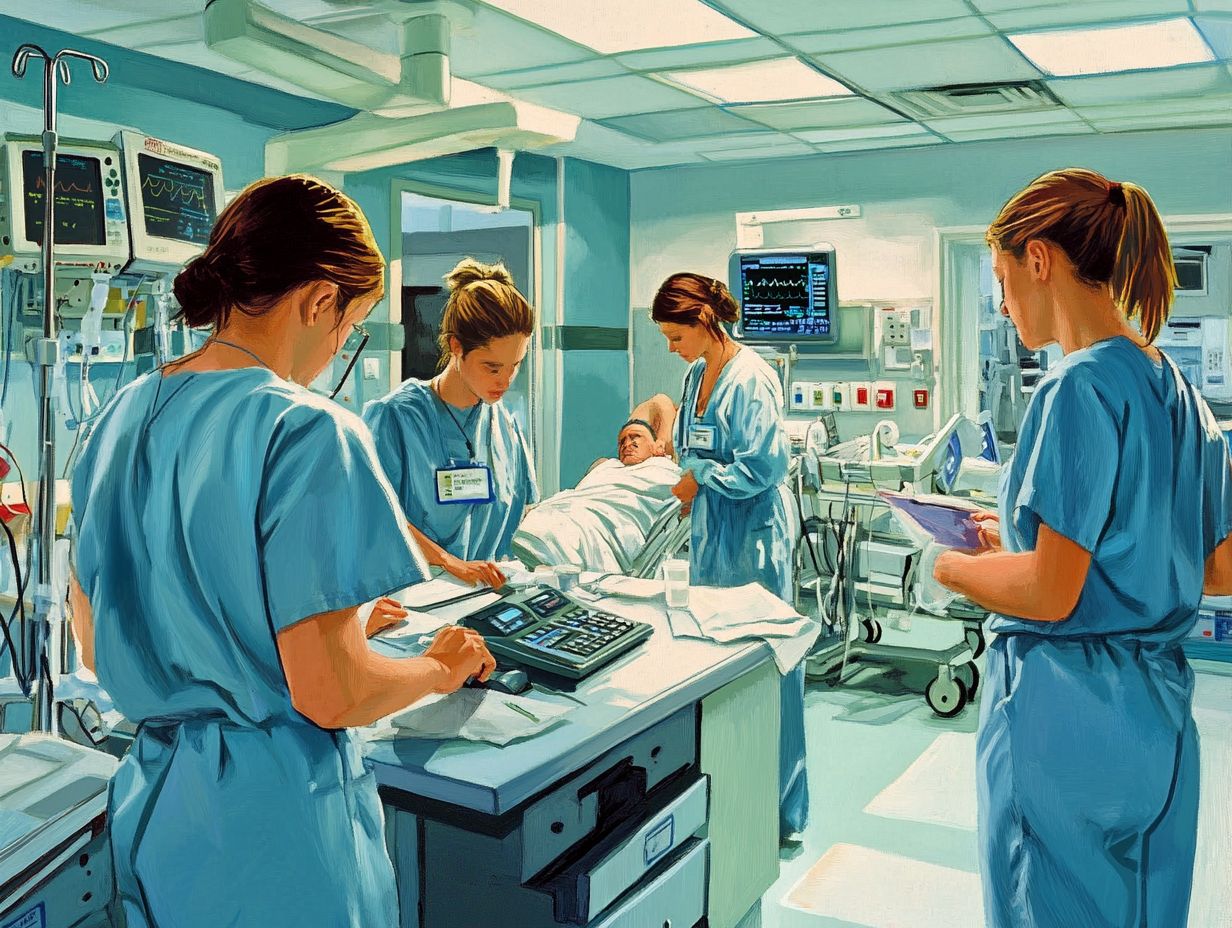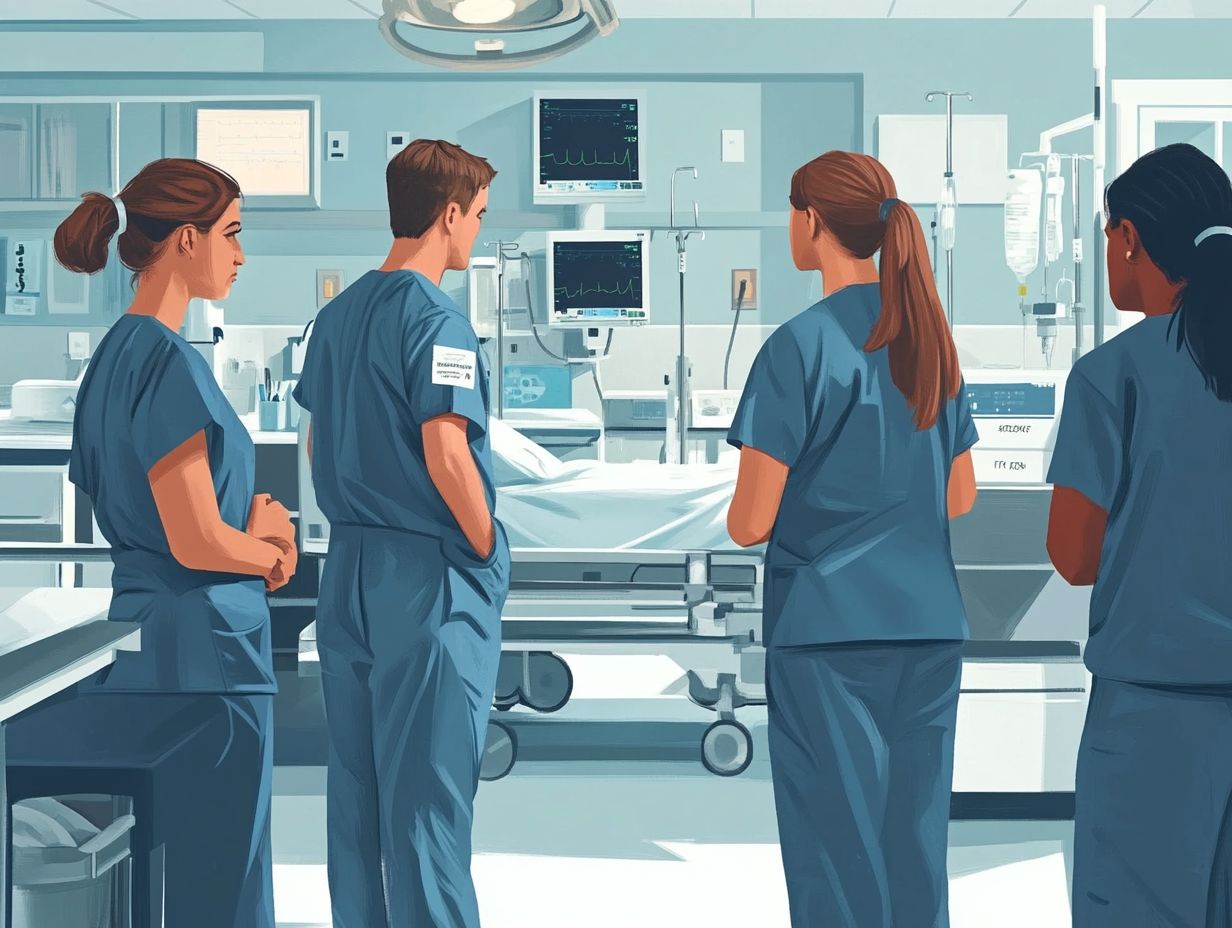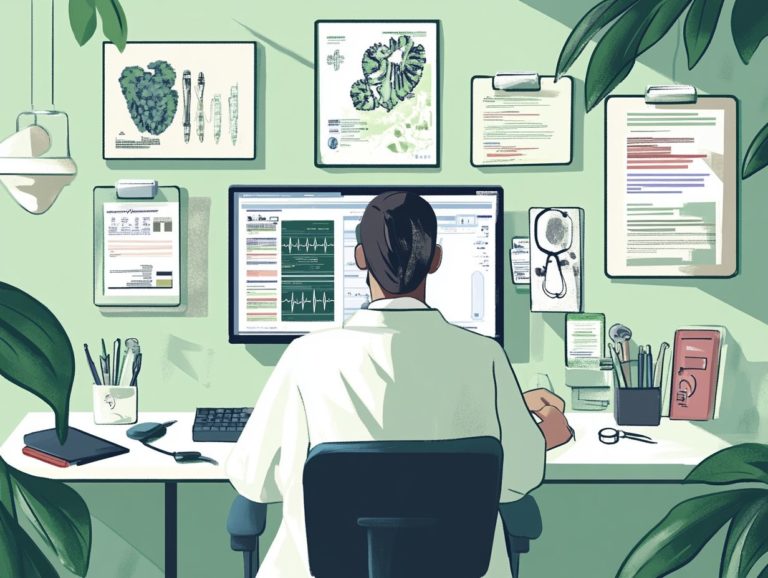7 Key Certifications for Respiratory Therapists
Ready to advance your career in respiratory therapy? Your ability to stay ahead hinges on the continuous enhancement of your skills and credentials.
This article delves into seven essential certifications that can truly elevate your professional expertise, ranging from the foundational Certified Respiratory Therapist (CRT) to specialized roles like the Neonatal/Pediatric Respiratory Care Specialist (NPS).
You ll find a detailed breakdown of the requirements, benefits, and costs associated with each certification, along with insights on how they can shape your career trajectory.
Whether you re just starting out or aiming to specialize, this guide offers valuable insights tailored specifically for you.
Contents
- Key Takeaways:
- 1. Certified Respiratory Therapist (CRT)
- 2. Registered Respiratory Therapist (RRT)
- 3. Neonatal/Pediatric Respiratory Care Specialist (NPS)
- 4. Adult Critical Care Specialist (ACCS)
- 5. Certified Pulmonary Function Technologist (CPFT)
- 6. Registered Pulmonary Function Technologist (RPFT)
- 7. Sleep Disorders Testing and Therapeutic Intervention (SDS)
- What Are the Requirements for Each Certification?
- How Do These Certifications Benefit Respiratory Therapists?
- What Are the Differences Between CRT and RRT?
- What Are the Advantages of Having Specialized Certifications?
- How Can These Certifications Help Advance a Career in Respiratory Therapy?
- What Are the Renewal Requirements for Each Certification?
- What Are the Costs Associated with Obtaining These Certifications?
- Frequently Asked Questions
- What are the 7 key certifications for respiratory therapists?
- What is the purpose of these certifications?
- How can respiratory therapists obtain these certifications?
- Do these certifications have expiration dates?
- What are the benefits of obtaining these certifications?
- Are these certifications recognized nationwide?
Key Takeaways:

The 7 key certifications increase job opportunities, salary potential, and professional growth. CRT and RRT are highly recognized, with RRT needing more advanced education.
1. Certified Respiratory Therapist (CRT)
The Certified Respiratory Therapist (CRT) credential is an essential certification in the field of respiratory care. It shows your basic skills necessary for delivering effective patient care across various healthcare settings.
This credential enhances your job opportunities and fuels your professional development in the ever-evolving field of respiratory therapy. As a CRT, you play a crucial role in patient evaluation, treatment planning, and promoting respiratory health among diverse populations.
You assess patients’ respiratory functions and collaborate with healthcare teams to craft tailored treatment strategies that cater to individual needs.
To obtain the CRT credential, you typically need to complete an accredited respiratory therapy program and pass the exam administered by the National Board for Respiratory Care (NBRC).
Holding this certification boosts your earning potential and opens up valuable networking opportunities in a competitive field. It paves the way for career advancement and the exchange of innovative practices.
2. Registered Respiratory Therapist (RRT)
The Registered Respiratory Therapist (RRT) credential signifies a distinguished level of expertise in respiratory therapy. It showcases your advanced skills in patient care and significantly boosts your job prospects within the healthcare sector.
Employers often prioritize RRTs for specialized roles, making this credential a valuable asset. These roles encompass areas such as pediatric care, where you collaborate with neonates and children who require tailored respiratory interventions.
Additionally, in adult critical care, your expertise becomes essential in managing complex cases in intensive care units. You ll gain crucial knowledge by pursuing certification programs and enhance your credentials.
This allows you to command higher salaries and accelerate your career growth. With continuous advancements in medical technology and treatment methodologies, RRTs who invest in ongoing professional development position themselves to adapt and excel across various healthcare environments.
3. Neonatal/Pediatric Respiratory Care Specialist (NPS)
The Neonatal/Pediatric Respiratory Care Specialist (NPS) credential offers specialized expertise in tackling respiratory disorders in infants and children. This certification is essential for enhancing your professional development and expanding your career opportunities in pediatric respiratory care.
This credential equips you with vital skills in patient evaluation and helps patients breathe better, specifically designed for neonates. It underscores the importance of grasping the unique physiological characteristics of this vulnerable population.
Mastery in areas such as airway management, advanced therapeutic techniques, and the assessment of complex respiratory patterns is crucial for executing effective interventions.
By pursuing this certification, you elevate your capacity to deliver high-quality care. This significantly influences patient outcomes and opens doors to specialized job prospects in a field that prioritizes pediatric health.
4. Adult Critical Care Specialist (ACCS)
The Adult Critical Care Specialist (ACCS) certification is essential for respiratory therapists dedicated to providing specialized care to critically ill patients. This credential emphasizes the importance of advanced certifications to effectively navigate healthcare complexities and improve patient outcomes.
By obtaining this certification, you refine your skills in diagnostic testing and treatment planning while gaining insights into managing intricate respiratory issues and critical care protocols.
In today s fast-changing medical landscape, possessing the ACCS credential significantly elevates your expertise, positioning you as a valuable asset in adult critical care settings. Acquiring this certification often leads to improved job prospects and higher salary potential.
As healthcare facilities increasingly seek specialists who deliver high-quality, evidence-based care to patients needing extra care, your ACCS certification can help you stand out in a competitive field.
5. Certified Pulmonary Function Technologist (CPFT)

The Certified Pulmonary Function Technologist (CPFT) credential enables respiratory therapists to expertly conduct pulmonary function testing, a critical tool for diagnosing and managing respiratory disorders.
This certification enhances your technical skills and deepens your understanding of how to interpret lung function results. Pulmonary function testing measures how well the lungs work and is vital for identifying conditions like asthma, chronic obstructive pulmonary disease (COPD), and restrictive lung diseases.
As the healthcare landscape evolves, job opportunities for CPFTs continue to grow. With this esteemed certification, you can pursue roles in hospitals, clinics, and specialized pulmonary centers, dramatically enhancing your career prospects.
6. Registered Pulmonary Function Technologist (RPFT)
The Registered Pulmonary Function Technologist (RPFT) certification represents a significant advancement in your competency. It allows you to conduct complex pulmonary function tests confidently.
This prestigious credential enhances your job prospects and elevates your earning potential in the respiratory therapy field. By earning this certification, you demonstrate expertise in advanced diagnostic testing while underscoring the importance of effective patient education.
As an RPFT, you play a key role in interpreting test results and collaborating with physicians to create comprehensive care plans tailored to each patient s individual needs.
This designation opens up various career pathways across diverse healthcare settings, including hospitals, outpatient clinics, and diagnostic labs. The RPFT certification not only boosts your professional profile but also paves the way for leadership opportunities in the evolving field of pulmonary care.
7. Sleep Disorders Testing and Therapeutic Intervention (SDS)
The Sleep Disorders Testing and Therapeutic Intervention (SDS) certification focuses on the specialized skills needed to assess and treat sleep disorders, crucial for patient care and respiratory health in respiratory therapy.
This certification helps you recognize the complexities of sleep-related respiratory issues, allowing you to implement evidence-based therapeutic interventions tailored to each patient’s needs. It highlights the importance of patient education, ensuring that individuals understand their conditions and available therapies.
Effective management often involves guiding patients on lifestyle changes that can significantly enhance sleep quality. Basic life support training is also a key component of this certification.
This training equips you to respond promptly to emergencies affecting patients with compromised respiratory function, safeguarding their well-being.
What Are the Requirements for Each Certification?
To obtain certification in respiratory therapy, you must meet standards set by accredited boards. This ensures you have the training and knowledge to provide high-quality care in various healthcare settings.
To achieve this credential, you’ll typically complete an accredited respiratory therapy program. This program combines theoretical coursework with hands-on clinical experience.
You’ll also need to pass a comprehensive examination that evaluates your competency in multiple areas of respiratory care. Continuous education means learning more over time to keep pace with industry standards.
Boards such as the National Board for Respiratory Care play a crucial role in this process. They establish rigorous standards to uphold the integrity and professionalism of the respiratory therapy field.
How Do These Certifications Benefit Respiratory Therapists?
Certifications in respiratory therapy offer a multitude of benefits vital for your professional growth. These include improved job opportunities, higher income potential, and significant professional development in this competitive field.
By acquiring specialized certifications, you can connect with a wider array of job roles, often securing positions that are better compensated and carry greater prestige.
Employers tend to value certified professionals more, recognizing the credibility and experience that these credentials bring. This recognition can lead to increased trust and responsibility in your workplace.
The path to obtaining these certifications often reveals valuable networking opportunities. It allows you to interact with industry leaders and fellow practitioners. This expanded network can pave the way for mentorship relationships and collaborations that foster professional growth.
Ultimately, this can lead to increased job satisfaction as you feel more empowered in your role.
What Are the Differences Between CRT and RRT?

The distinctions between the Certified Respiratory Therapist (CRT) and Registered Respiratory Therapist (RRT) credentials hinge on expertise, required skill sets, and the array of job opportunities available for each designation within the respiratory therapy realm.
While both certifications hold significant value for aspiring respiratory therapists, the pathways to achieve them diverge considerably. Achieving the CRT typically involves obtaining a basic associate degree and passing an entry-level exam, serving as a solid entry point for those embarking on this profession.
Conversely, attaining RRT status demands further training and education, generally including a bachelor s degree, along with passing a more rigorous examination. This distinction not only underscores the varying skill sets but also substantially influences career trajectories.
As an RRT, you often encounter broader responsibilities, access to advanced job positions, and enhanced earning potential compared to CRTs. Therefore, it’s essential for individuals in the field to thoughtfully consider their career aspirations when deciding which certification aligns best with their goals.
What Are the Advantages of Having Specialized Certifications?
Specialized certifications in respiratory therapy open doors to exciting job prospects and boost your professional credibility! They provide you with a wealth of advantages, including broader job prospects, enhanced professional credibility, and opportunities for continuous development.
Credentials like NPS and ACCS reflect a higher level of expertise and resonate with the evolving demands of modern healthcare. By committing to rigorous training and ongoing education, you demonstrate your dedication to best practices and patient care standards.
This commitment often means better job opportunities because healthcare employers look for professionals with unique skills. Moreover, these certifications can pave the way for promotions and advanced roles, enabling you to step into leadership positions or specialized functions within your organization.
Ready to take the next step in your respiratory therapy career? Pursue your certification today!
How Can These Certifications Help Advance a Career in Respiratory Therapy?
Certifications play a crucial role in elevating your career in respiratory therapy by unlocking specialized job opportunities and fostering professional development. Ultimately, this enhances your job satisfaction and longevity in the field.
By obtaining certifications, you can clearly demonstrate your dedication to the profession, significantly increasing your chances of promotions. Employers often prioritize candidates with additional qualifications.
Many individuals have experienced notable changes in their career trajectories. For example, a therapist shared that her advanced certification propelled her into a managerial position in just one year, accompanied by a considerable salary increase.
Others have shared similar experiences, noting that their enhanced skills not only led to increased responsibilities but also inspired a renewed sense of confidence and purpose in their work.
Investing in your growth is a game-changer! It undoubtedly brings rewards, both personally and financially.
What Are the Renewal Requirements for Each Certification?
Each certification in respiratory therapy comes with specific renewal requirements designed to keep you at the forefront of the latest practices and advancements in patient care. This underscores the vital role of continuing education.
To maintain your credentials, you’ll need to accumulate a designated number of continuing education credits earned through relevant workshops, courses, or seminars.
Some certifications may also require you to pass a recertification exam, demonstrating your ongoing competence in essential skills and knowledge. You may also need to follow ethical standards and participate in professional organizations, both of which enhance your professional standing and commitment to delivering quality patient care.
This structured approach ensures that you remain well-informed and proficient in the rapidly evolving landscape of healthcare.
What Are the Costs Associated with Obtaining These Certifications?
The costs associated with obtaining certifications in respiratory therapy can vary considerably, encompassing expenses related to training programs, exam fees, and continuing education courses. This financial investment plays a crucial role in your professional growth.
As a prospective candidate, you should be mindful of potential hidden fees, such as those for study materials and certification maintenance, which could add to your financial strain. It s essential to thoroughly research various training institutions and their associated costs. Some programs may offer all-inclusive packages, while others might require you to make separate purchases.
Fortunately, funding options like federal financial aid, state scholarships, and specific grants are often available. These resources can help lighten the financial load for aspiring respiratory therapists, making the path to professional certification much more accessible.
Frequently Asked Questions

What are the 7 key certifications for respiratory therapists?
- Certified Respiratory Therapist (CRT)
- Registered Respiratory Therapist (RRT)
- Neonatal/Pediatric Specialist (NPS)
- Sleep Disorders Testing and Therapeutic Intervention (SDS)
- Certified Pulmonary Function Technologist (CPFT)
- Registered Pulmonary Function Technologist (RPFT)
- Adult Critical Care Specialist (ACCS)
What is the purpose of these certifications?
These certifications are meant to demonstrate a respiratory therapist’s knowledge, skills, and competency in specific areas of respiratory care. They also provide a standard of excellence for employers and patients seeking respiratory care services.
How can respiratory therapists obtain these certifications?
Respiratory therapists can obtain these certifications by meeting specific education and experience requirements and passing a standardized exam administered by the National Board for Respiratory Care (NBRC).
Do these certifications have expiration dates?
Yes, these certifications have expiration dates and must be renewed periodically. The renewal process typically involves completing continuing education credits and paying a renewal fee.
What are the benefits of obtaining these certifications?
These certifications can boost your career and increase your earning potential as a respiratory therapist. They show that you are committed to being knowledgeable in respiratory care.
Are these certifications recognized nationwide?
Yes! They are recognized across the United States and in several other countries. Keep in mind that requirements may differ internationally.






